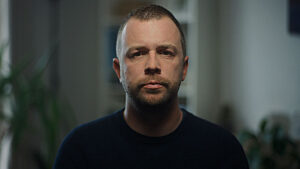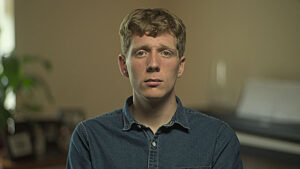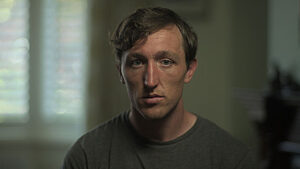
Alan Bradley told David Hennesy about his revealing documentary, Unspoken which deals with the often unspoken about crisis of eating disorders in men.
A searingly honest documentary sees three Irish men open up about the realities of living with an eating disorder is about to screen at Shout London, the mental health and arts festival from Ashford Place.
Unspoken reveals the crisis of eating disorders in Irish men and highlights the public system currently failing them.
Eating disorder cases are spiking, according to Bodywhys: The Eating Disorder Association of Ireland. Despite the increase in men coming forward it still remains a largely hidden, silent issue.
Cormac Ryan, a former Dublin minor hurler, Eoin Kernan and Daniel O’Boyle all shared their stories for the film.
On Shout London Alan says: “I think it’s amazing and I wish there were more of them.
“We were delighted to be asked to screen at it.
“We need spaces like this where people can come watch different types of content like this and then have the opportunity to be in the room with other people and talk about it, make connections there.
“I think that’s really valuable.”
What moved you to make this documentary?
“I was looking for a story.
“To make a documentary takes over your whole world.
“I suppose I was looking for a story that I felt I really wanted to do that with, and that was worth it.
“I actually just came across an article where it said up to a third of people with eating disorders are men or boys and I wouldn’t have expected that at all.
“I just wasn’t sure if that was the case in Ireland as well.
“I kind of just started looking into it and the more and more I looked into it, the more and more I realised it felt like a very untold story and something I didn’t know anything about and had never really heard about and wouldn’t expect.
“That’s where it came from.
“I just thought, ‘Why is nobody talking about this when it actually is quite a big issue?’
“Then I reached out to different organisations and different people.
“I spoke to a lot of guys who had eating disorders and it just shocked me the barriers that were in their way for getting care.
“The types of guys that had eating disorders you wouldn’t expect, you mightn’t think by looking at them.
“So I suppose I wanted to make a piece because I had so many misconceptions that were constantly being busted.
“I just wanted to make something that sort of shared that more widely so that’s where it came from.”

As you say there are so many misconceptions about eating disorders…
“85% of people with eating disorders aren’t underweight.
“I think we always have this perception it’s a skinny teenage girl severely malnourished, realistically a white girl, probably from a middle class background.
“That is true too, that does happen and those cases should be taken seriously as well but there’s way more other people that it affects and we’re just missing them because we’re just not aware.
“There’s loads of people who aren’t underweight at all and struggle with types of eating disorders and it can really, really limit and ruin their lives.”
And how did you find your subjects? How did you get three guys brave enough to talk about it?
“It took a long time and it was quite tricky because, as far as we’re aware anyway, there had not been a documentary before in Ireland about men with eating disorders.
“Nobody had come forward.
“Anything that was out there in the media would be print articles or maybe a bit of radio, but everyone would be anonymous.
“Of course, for a TV documentary, you have to show your face so that was tricky.
“I spoke to every eating disorder specialist in the country.
“BodyWhys, the eating disorder association of Ireland, were great help.
“They put out a bit of a call in their network and then what I did is I just spoke to loads of different guys just to hear all the different types of experiences.
“What was important to me, and which is why we have three different lads, is eating disorders are very varied depending on the person, there’s no one story as such.
“It’s very varied and nuanced for every person so I wanted to get three different guys at different stages in their journey from different backgrounds to get as broad a sense of the condition as we could.
“That’s where Cormac, Daniel and Eoin all fit in really well, because they’re all very different and bring something to the table themselves.”
What you say there reminds me of a note I made. In the film Daniel speaks of asking for professional help and being told he was ‘atypical’ as he wasn’t a girl with an eating disorder. I was surprised a doctor told him he was atypical because there is no typical..
“Yeah, the stuff I encountered from all the stories I heard was just mind blowing.
“Yeah, you would think no doctor would ever say that to somebody but apparently that’s actually quite common.
“What Daniel was actually told, as well as being atypical, was that he was that this particular doctor dealt with teenage girls who were half the size of his leg: In other words, ‘What’s your problem? You’re not that bad off’.
“And Daniel had finally reached out for some help.
“It’s a very vulnerable place to be so when you finally make that step and then you’re met with that level of ignorance, it’s a disaster.
“Also the eating disorder wants to keep you where you’re at, it doesn’t want you to get help so if someone else comes along, especially if somebody is a doctor, and says there’s nothing wrong with you, your eating disorder is going to jump on that.
“It’s delighted because that’s what it wants to hear and it kind of gives this idea that you’re not sick enough.
“The sad thing is that often encourages people to get more sick and more sick because they don’t seem sick enough.
“I think it’s gotten a bit better in recent years but it’s still nowhere where it needs to be.
“We don’t look for it, we don’t expect it in boys and men.
“That’s what I found with Cormac in particular, because he plays GAA.
“He played hurling, he was a Dublin minor and he could hide behind being an athlete.
“His very strict, regimented way of eating, that was him being really disciplined.
“People would praise him for it, ‘Wow, you’re so committed. You’re so dedicated. Fair play to you’.
“Actually, it was a really toxic trait of the eating disorder that they were seeing.
“The over exercising: Again, in men, that’s easier to hide as something that’s really positive, rather than seeing the actual struggle that’s going on there.”

Did Cormac get a big reaction, including from the GAA community after the film went out?
“Yeah, all the lads had a huge reaction.
“Cormac had a huge reaction from all kinds of people.
“I know after the film aired, he had loads of men reaching out to him on social media, direct messaging him, telling him stories about themselves and their struggles and not just people from the GAA but people who are very involved in gym culture.
“Cormac has said to me himself before he thinks there’s a lot of people in the GAA community struggling with issues like this, but that it’s quite hidden away.
“It helps just the more and more we talk about these things.”
GAA was also part of Daniel’s story in that he was comparing himself to lads who were athletic..
“Yeah, I think it’s really different for everybody.
“It’s for all kinds of reasons really.
“Often this kind of comparison thing is part of it that starts pretty early on, of comparing yourself less favourably to others.
“What we tried to sort of get across in Unspoken, and it’s sometimes hard for people to understand, but eating disorders aren’t really about food at all, it’s really masking something else that’s usually some kind of sense of low self worth or a low sense of yourself.
“I think that’s where the comparison comes in. It’s not just about how people look.”
If it all starts with unfair comparisons then you have to wrorry for this younger generation growing up with social media..
“100%, I think what it is is the exposure to so much unrealistic content.
“Now there’s constant bombardment.
“On social media, you would swear everyone in the world is ripped with abs when actually most people aren’t obviously.
“I think particularly for young people, they’re still developing.
“I don’t know if they’re able to have the world experience to understand that that’s not real.
“I think that’s a big problem that we’re just going to see more and more of.”

Unspoken depicts three young men. Eoin has a partner in Karolina but it doesn’t seem to me like Cormac or Daniel could have a partner or even have some pints with mates..
“It’s very, very isolating.
“Eoin and Karolina were together before the eating disorder sort of kicked in so that might have played a role there.
“It’s very isolating.
“Food takes up so much of all of our days.
“A lot of social things revolve around food or drinks even if it’s just going for a coffee.
“Those types of things create so much anxiety often for someone with an eating disorder that their world becomes very, very limited or if they are seeing anybody, they’re so wound up in their heads, so distracted by everything going on in their mind that they’re not really there and present with whoever they’re with.
“I think it can be really hard then to maintain relationships.
“Even work can be really, really hard.
“I don’t know how some of the lads held down jobs while they were jugging all this.
“It puts a huge strain on everything and everyone around you.”
There is a message at the end that more services have been created for people suffering with eating disorders.
Is there more help now?
“Yeah, slightly. They’ve improved slightly but it’s nowhere near where it needs to be in Ireland at all.
“There’s to this day only three adult beds for eating disorder care as an inpatient in the entire country, and they are in the St Vincent’s catchment area of Dublin.
“There is nothing else in the rest of the country in that regard which is so hard to comprehend really.
“What are people supposed to do?
“It’s been brought up in the Dáil Éireann so many times over the years but the sad thing is we made Unspoken in 2021 and since then, there’s still not an extra bed in the country since for adults.
“The way they’ve set it up is they have these hubs that are not even all in place around the country, but the idea with them is to do early intervention in the community so when someone’s not well in early days, they go to this hub and they sort of nip it in the bud, because we know that early intervention is the best outcome.
“The problem with these hubs is a lot of them are understaffed and they’re overwhelmed and they’re dealing with people who are really very, very sick, extreme cases, and they’re kind of clogging up the system, so it’s not really doing what it’s supposed to do, because the people who are early days still have nowhere to go.
“It’s just this perpetual problem.
“I believe that the way the system is set up just isn’t working as well as it being underfunded and under resourced.”
Unspoken was part of the line up for last weekend’s Shout London, the third annual London mental health and arts festival from Ashford Place.
You just made another film about anorexia.
You seem to be concerned with mental health in your work, are they the sort of stories that interest you because they could help someone?
“I think it’s just stories that I feel are really untold and when I find out about them I’m like, ‘Why is no one talking about this?’
“And then I want to make something that maybe will draw attention to it or highlight it just because I think we should be talking about it.
“Eating disorders have the highest fatality rate of any mental health condition and there’s only three beds in the country and they’re in one little catchment area of Dublin.
“How is that possible in modern Ireland, one of the wealthiest countries in the world?
“It just doesn’t make any sense.
“We need to talk about these stories.”
What were the reactions of Cormac, Daniel and Eoin to what you did with their stories? Were they pleased?
“Yeah, thankfully, because obviously you’re always worried about that.
“It’s such a vulnerable thing they do to share so much of themselves and their lives.
“I was relieved that they were happy with it.
“They’ve gone on to do great things since.
“All of them are doing really well.
“All three of them have done loads of work since, doing talks, going into schools, going into sports clubs, sharing their story further.
“It’s had a really positive impact and they’re constantly having people, both men and women, reaching out to them- Even now a few years later- saying watching the documentary kind of sprung them to go on and get a bit help, or it helped them finally start a conversation with their son about being worried about them.
“That’s lovely to hear because when you make a documentary, you’re kind of making something in a vacuum.
“It’s nice when you get to see it’s had some sort of effect.
“After it aired, it sparked a big conversation online.
“It was all very positive.
“It was allowing people to share their own stories.
“It was allowing people to sort of share the facts and the myths that they had and that they had learned and there was a lot of talk as well about the services and the need for change there.
“Then it went on to win some awards but that sort of reaction from people means more than the awards because that’s real world stuff.”
For help with eating disorders in Ireland, visit Bodywhys.ie or phone their helpline on 1890 200 444.
In the UK, visit pedsupport.co.uk or call 01733 300290.



